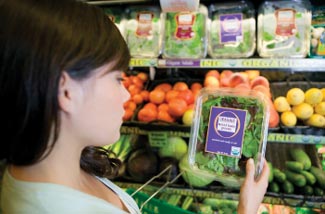The value of organic certification
by Pamela Coleman
This article was originally published in January 2009

(January 2009) — All natural? Non-GMO? No antibiotics or hormones? Aren’t they just as good as certified organic, just a little less costly?
No doubt, when buying food the savvy shopper faces a dizzying array of labels and choices. Feeding the family never has been so complex.
Many consumers choose organic food because research shows it’s more nutritious as well as safer for the farmer and better for the environment. But the often higher cost may raise the question, what does the organic label provide that other “natural” claims don’t? Is it worth it?
My experience as an organic inspector, reviewer and board member allows me to answer, yes. I’ve seen firsthand that foods bearing the organic label are scrutinized in a uniquely careful way through every step of production. The certification process ensures a level of assurance that we just cannot get when someone claims to be following organic methods — but is not certified.
When you buy organic fruits or vegetables at PCC Natural Markets, you are assured that a paper trail has tracked the production and handling methods from the farm to the warehouse to the store. An organic certification agency verifies that the organic standards have been followed at each step of the way.
When you see the word organic or see the organic seal on the front label of a packaged food, it means the processor is certified organic. A processor might freeze vegetables, press fruit into juice, can tomato sauce, ferment soy sauce, or assemble a complete frozen dinner — the list is almost endless.
Whether farmer, handler or processor, organic certification begins when the operator sends an application packet to a certification agency. Many farmers choose a local certifier, such as the Washington State Department of Agriculture, but they can choose any certification agency accredited by the National Organic Program of the U.S. Department of Agriculture (USDA).
The application packet includes an organic system plan. Farmers describe the farm location, the crops, and the cultivation practices. Handlers and processors describe how they track their organic product to prevent it from being contaminated with non-organic products or chemicals. Processors list all ingredients in their products, the sources, and the percent of each ingredient.
All this is highly confidential information and all certification agencies treat it as such. Each operator also signs an agreement to comply with organic regulations.
Next, the certifier reviews the organic system plan to determine if all the practices are allowed in an organic operation. When everything is in order, an inspector visits the farm or processor.
On a farm inspection, the inspector looks at all the fields where organic crops are grown. She reviews the crop production cycle — from planting the seeds to harvest and sale of the crop.
She checks the crop varieties to determine that no genetically modified crops have been planted in the organic fields. If the farm has livestock, the inspector confirms that they’re fed organic feed, given access to pasture, and never treated with antibiotics.
Most important, she looks at all the records of fertilizers and pest control measures used, and verifies that no prohibited materials were applied to the organic crops. This method has proven to be more effective at catching “mistakes” than simply testing crop samples for residues. If any prohibited materials have been used, that field is removed from the organic program for three years.
On a processing inspection, the inspector walks through the plant and follows the process from raw ingredients to the finished product, to determine whether the system plan is being followed. She conducts an audit by looking at receipts for purchased ingredients and sales of the finished product. An inspection can last from a few hours to several days.
At every inspection, the inspector reviews all organic standards, explains how important it is to follow the organic regulations, and writes a report to document her findings.
The certifier reviews the inspection report and issues an organic certificate as a warranty that the product is organic.
From the farmer to the consumer, each person in the organic supply chain carefully preserves the organic nature of the food.
So when you buy organic, it may cost a bit more than non-organic, chemically farmed food because the costs of certification are paid by the farmers, handlers and processors. There is no ongoing government support. But you can rest assured that you really are getting what you paid for.
Pamela Coleman has worked for organic certification agencies and organic farms on the East and West coasts. She also serves on the board of directors of PCC Farmland Trust.
